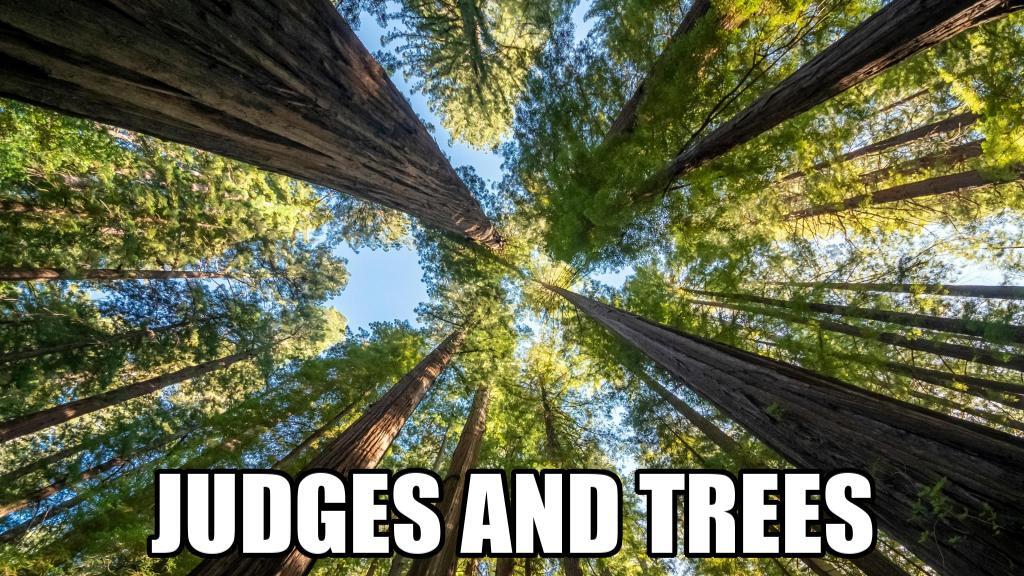JUDGES AND TREES

Every time we read the news, or watch the news, we’re gripped by the same fear: how can Israel possibly survive? Surrounded by enemies, outnumbered and outgunned, a tiny nation in a vast and hostile region — the math doesn’t add up.
And it’s not just the rockets, the terror, or the armies on our borders. It’s the United Nations passing endless resolutions against Israel, the International Criminal Court and the International Court of Justice circling like vultures, the countries lining up to recognize “Palestine” while denying Jewish history and legitimacy.
If you believed in the laws of nature alone, you’d say Israel doesn’t stand a chance. By every rule of the jungle, the mighty should prevail over the weak, the many should overwhelm the few. And yet, somehow, against all odds, Israel stands. What is our secret? And can we be confident about our future?
Parshat Shoftim begins with one of the Torah’s most famous lines (Devarim 16:18): שֹׁפְטִים וְשֹׁטְרִים תִּתֵּן־לְךָ בְּכָל־שְׁעָרֶיךָ… וְשָׁפְטוּ אֶת־הָעָם מִשְׁפַּט־צֶדֶק – “Judges and officers shall you appoint for yourselves in all your gates… and they shall judge the people with righteous judgment.”
So far so good. Justice, fairness, integrity — a society needs this. But then the Torah suddenly shifts gears. The very next pasuk is this (Devarim 16:21): לֹא־תִטַּע לְךָ אֲשֵׁרָה כָּל־עֵץ אֵצֶל מִזְבַּח ה’ אֱלֹקֶיךָ – “Do not plant for yourself an Ashera tree, any kind of tree, next to the altar of the Lord your God.”
Wait — what? We were talking about judges and courts — why are we suddenly talking about idolatrous trees? Why would trees follow pesukim about the judiciary?
Chazal pick up on this strange anomaly. To explain this odd proximity, the Gemara in Sanhedrin (7b) says: Anyone who appoints an unworthy judge is like someone who planted an Ashera tree next to the mizbe’ach.
That’s a strong comparison. But truthfully, it sounds a bit arbitrary. Almost as if the Gemara is straining to manufacture a link between two totally unrelated topics.
Rav Uziel Milevsky (1945–1992) was a gifted Sephardic Torah scholar and educator, born in Mexico, who studied under Rav Chaim Shmulevitz in the Mir yeshiva, and later served as Chief Rabbi of Mexico City and in Toronto. Tragically, he died young – but he is best remembered for his insightful sefer Ner Uziel.
Rav Milevsky explains this beautifully. He says that an Ashera tree represents the worship of nature — the deification of raw, natural forces. In ancient times, people literally bowed down to trees, to rivers, to the sun, to the moon. You can find that strange, because it sounds so primitive. But modern versions of Ashera worshippers aren’t much better.
Do you know who I’m talking about? Simple. Look at today’s radical environmental movements. Don’t get me wrong — Judaism absolutely values the environment. The Torah warns us about “בל תשחית” — you cannot destroy anything needlessly.
We have an absolute duty to protect the world God gave us. But environmental obsessives cross a line. Nature becomes not just something to protect, but something to worship. It’s more important than anything else.
I’ll give you an example: “tree spiking.” Have you heard of it? Environmental extremists hammer metal rods into tree trunks so that when loggers cut the tree with their powerful electric saws, the blades shatter — and it sends shrapnel into the face of the worker. People have been blinded, and even killed.
Do you know why they do it? All to save a tree. Because they are environmentalists. The trees are more important than humans. They are willing to injure or even kill humans to save a tree. That’s a modern-day Ashera — elevating nature over human life. The human is a sacrifice to the tree-god.
I’ll admit, though, that trees can be awe-inspiring. I once visited Muir Woods National Monument with my family and saw the giant redwoods. Some of them are 200 or 250 feet tall — about a 20–25 story building.
The oldest ones are over 1,000 years old! They were already alive when the Rambam was writing the Mishneh Torah, and they’re still alive today. I remember standing there with my kids, craning our necks until it hurt, jaws dropping, thinking: this is what eternity must look like.
And you can almost understand why someone might think: this is divine. But in the end, do you know what — they’re just trees. Magnificent, yes, but they’re not God.
And that’s the point. The pure laws of nature are brutal. The Rambam is dead for centuries, and these trees are still alive. It’s the survival of the fittest. The strongest wins, the weakest dies. That’s the law of the jungle. So you might think that the redwood is greater than the Rambam.
But the Torah demands something very different from human society. It’s not complicated, but it’s important. The pasuk tells us: צֶדֶק צֶדֶק תִּרְדֹּף — “justice, true justice, you must pursue.”
What does this mean in real terms? When a wealthy landowner and a penniless beggar walk into a courtroom, the Torah says: Don’t you dare favor the strong over the weak, the rich over the poor. Don’t apply “survival of the fittest.” Apply “survival of the truthful.” Right is right, and wrong is wrong — no matter who is standing in front of you.
And with that, we can understand the link between Shoftim ve’Shotrim and an Ashera. If you appoint a corrupt judge who plays favorites, you’ve effectively planted an Ashera tree in your court. You’ve imported the law of nature — might makes right — into a place that’s supposed to run on the law of God. It’s not the law of the jungle, it’s the law of God.
History shows us how dangerous the law of might over right can be. Corrupt judges and favoritism have toppled entire civilizations. People think that Ancient Rome collapsed because of barbarian invasions. It’s not true. Rome rotted from the inside, through corruption and injustice.
Even in modern times, regimes that made “law” into a tool for the powerful — Nazi Germany, Soviet Russia — became machines of injustice, trampling the weak.
And on the flip side, the greatness of democracies like America at their best has always been their commitment to equality before the law — that justice is blind, not tilted toward the powerful.
Churchill — who knew a thing or two about power, courts, and corruption — once said: “The foundation of freedom is justice. And the foundation of justice is law.” But he added: “The law must be just, not an instrument of the strong.” That’s Shoftim in a nutshell.
So the Torah is teaching us: Don’t let your courts turn into jungles. Don’t let “Ashera” — the worship of raw power, of nature red in tooth and claw — creep into the way you judge. A society that wants to survive needs justice, not just strength. Because at the end of the day, might is not right. Right is right.
And this, I think, is why Israel will endure, no matter what the odds look like. By the laws of nature, we shouldn’t still be here. Israel is a tiny country. The Jews are a tiny people. According to the logic of “survival of the fittest” we should have disappeared long ago.
The redwood seems stronger than the Rambam — tall, majestic, and immovable. But in the end, the Rambam prevails. We are still learning Rambam a thousand years later, still shaping our lives around his Torah, while the redwood is just a tree. Awe-inspiring, yes — but silent, lifeless wood.
Our enemies can put their trust in the laws of nature. We put our trust in God’s Torah. And that is why — against every prediction, against every headline — Am Yisrael Chai.
(Based on a Parsha Shiur by Rabbi Yissocher Frand)

